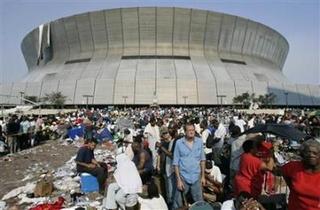Failure Is An Option

It is four days since Katrina hit the city, and only now
have the National Guard arrived with food and water
for the tens of thousands of refugees at the New Orleans
Convention Center.
"The people of our city are holding on by a thread,"
Mayor Ray Nagin warned in a statement to CNN. "Time
has run out. Can we survive another night? And who
can we depend on? Only God knows." Earlier, in a
rambling radio interview, Nagin erupted in tears and
anger, saying, "Get off your asses and let's do
something."
How shitty has the government’s disaster response been?
So shitty that the man in charge is blaming the victims
for his own incompetence:
“Well, I think the death toll may go into the thousands.
And unfortunately, that's going to be attributable a lot
to people who did not heed the evacuation warnings.
And I don't make judgments about why people choose
not to evacuate.
“But, you know, there was a mandatory evacuation of
New Orleans. And to find people still there is just heart
wrenching to me because the mayor did everything he
could to get them out of there. And so we've got to
figure out some way to convince people that when
evacuation warnings go out, it's for their own good.
Now, I don't want to second guess why they did that.
My job now is to get relief to them.”
- Michael Brown
(Federal Emergency Management Agency Director)
So poor people are just shit out of luck. Don’t have a car?
Have nowhere to go? Too old and sick to travel?
Good luck! Enjoy your tax cut.
But how is it that a predictiable hurricane creates
third world disaster conditions across the US gulf coast?
This timeline over at The Washington Monthly outlines the
past 4 years of FEMA’s mismanagement and concludes:
“A crony with no relevant experience was installed as
head of FEMA. Mitigation budgets for New Orleans were
slashed even though it was known to be one of the top
three risks in the country. FEMA was deliberately
downsized as part of the Bush administration's
conservative agenda to reduce the role of government.
After DHS was created, FEMA's preparation and
planning functions were taken away.
Actions have consequences. No one could predict that a
hurricane the size of Katrina would hit this year, but the
slow federal response when it did happen was no
accident. It was the result of four years of deliberate
Republican policy and budget choices that favor
ideology and partisan loyalty at the expense of
operational competence. It's the Bush administration in
a nutshell.”
Once again, our nation faces a terrible crisis.
American citizens are dying in the streets, and
there is no leadership at the top.
Did you enjoy your vacation, Mr. President?
"George W. Bush gave one of the worst speeches of his
life yesterday, especially given the level of national
distress and the need for words of consolation and
wisdom. In what seems to be a ritual in this
administration, the president appeared a day later than
he was needed. He then read an address of a quality
more appropriate for an Arbor Day celebration: a long
laundry list of pounds of ice, generators and blankets
delivered to the stricken Gulf Coast. He advised the
public that anybody who wanted to help should send
cash, grinned, and promised that everything would
work out in the end."
-- NY Times Editorial [9/1/05]
“We've got a lot of rebuilding to do. First, we're going
to save lives and stabilize the situation. And then we're
going to help these communities rebuild. The good news
is -- and it's hard for some to see it now -- that out of
this chaos is going to come a fantastic Gulf Coast, like it
was before. Out of the rubbles of Trent Lott's house --
he's lost his entire house -- there's going to be a
fantastic house. And I'm looking forward to sitting on
the porch.”
-- George W. Bush [9/2/05]
If you’ve been watching any TV news coverage of this
nightmare, you may have noticed that most of the people
trapped in the Big Easy bear little resemblance to the
former Senate Majority Leader.
Jack Shafer writes in Slate:
“To be sure, some reporters sidled up to the race and
class issue. I heard them ask the storm's New Orleans
victims why they hadn't left town when the evacuation
call came. Many said they were broke—"I live from
paycheck to paycheck," explained one woman. Others
said they didn't own a car with which to escape and
that they hadn't understood the importance of
evacuation.
“But I don't recall any reporter exploring the class
issue directly by getting a paycheck-to-paycheck victim
to explain that he couldn't risk leaving because if he
lost his furniture and appliances, his pots and pans, his
bedding and clothes, to Katrina or looters, he'd have no
way to replace them. No insurance, no stable, large
extended family that could lend him cash to get back on
his feet, no middle-class job to return to after the
storm.”
But they could have just asked the First Lady:
"This is what happens when there's a natural disaster
of this scope. The poorer people are usually in the
neighborhoods that are the lowest or the most exposed
or the most vulnerable. Their housing is the most
vulnerable to natural disaster. And that is just always
what happens."
Feel better?


<< Home